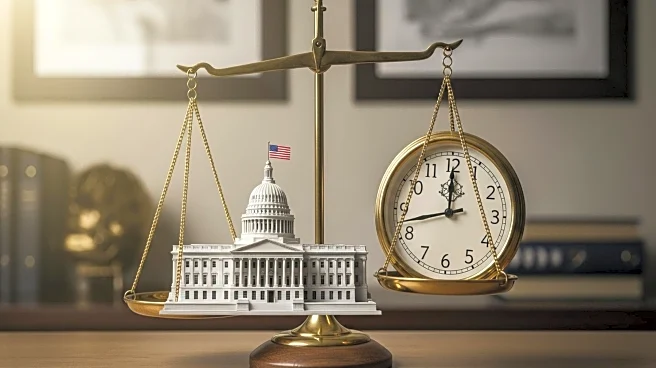What's Happening?
The U.S. Senate is scheduled to vote on a clean funding bill on Tuesday night, which is expected to fail for the eighth time amid the ongoing government shutdown. President Trump has ordered the Pentagon to utilize all available funds to ensure that approximately 2 million service members receive their mid-month paychecks on October 15th. The Department of War has identified $8 billion in unobligated funds from the previous fiscal year to facilitate these payments. Vice President JD Vance indicated that income tax and tariff revenues would contribute to the funding. The shutdown has led to mass layoffs in federal departments, including Education and Health and Human Services, affecting services such as special education.
Why It's Important?
The government shutdown has significant implications for federal employees, military personnel, and public services. The failure to pass a funding bill exacerbates economic uncertainty and disrupts essential services. The layoffs in key departments could impact vulnerable populations, such as children with disabilities, who rely on special education services. The use of unobligated funds to pay military personnel highlights the administration's efforts to mitigate the shutdown's impact on service members. However, the legality of these actions and the long-term consequences remain uncertain, with potential legal challenges to President Trump's tariffs also looming.
What's Next?
If the funding bill fails again, the government shutdown may continue, leading to further economic and social disruptions. The administration may face legal challenges regarding the use of funds and tariffs. The Supreme Court is set to decide on the legality of President Trump's tariffs, which could have significant financial implications. Federal departments may experience deeper cuts, affecting public services and employee livelihoods. The situation demands urgent resolution to prevent further adverse effects on the economy and public welfare.
Beyond the Headlines
The shutdown underscores the political tensions between the administration and Congress, with President Trump targeting Democratic programs for cuts. This political maneuvering could deepen partisan divides and affect future policy decisions. The closure of popular attractions like Smithsonian museums and the National Zoo highlights the broader cultural impact of the shutdown, affecting tourism and local economies. The administration's approach to funding military paychecks reflects unconventional strategies that may set precedents for future fiscal management during government shutdowns.










